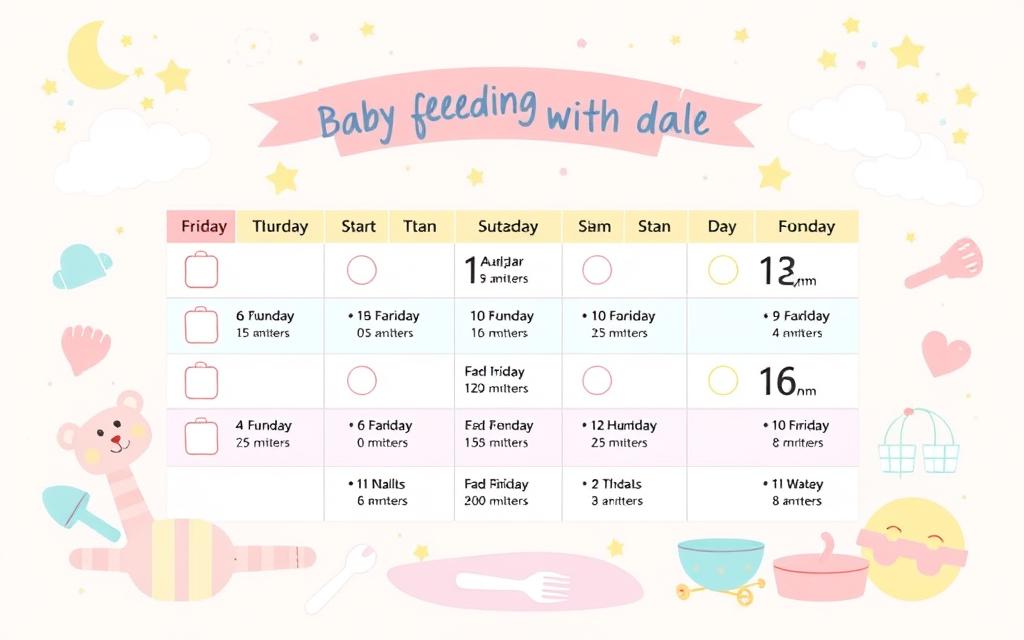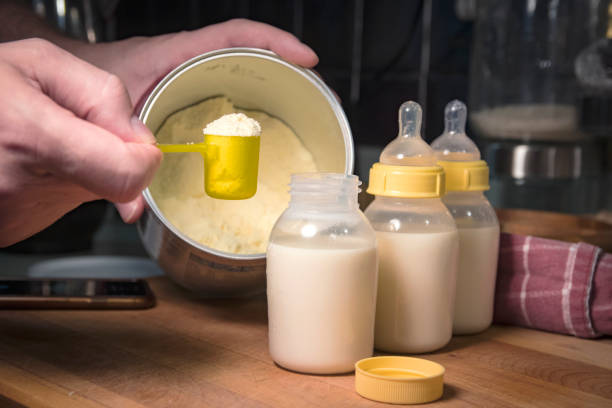Establishing a Daily Routine for Baby

Starting as a new parent can feel overwhelming. But, setting up a daily routine for your baby is key for their growth. A routine makes your baby feel safe and helps them learn good habits. We’ll show you why a daily routine is important and how to make one that fits your baby’s needs.
Following a routine gives your baby a sense of stability and predictability. This is vital for their emotional and physical development. It also helps you stay organized and meet your baby’s needs. We’ll share the benefits of a routine and offer tips on creating one that suits your baby’s unique needs.
Key Takeaways
- Establishing a daily routine for baby is key for healthy growth.
- A routine makes your baby feel secure and helps them learn good habits.
- Creating a baby daily schedule helps parents stay organized and meet their baby’s needs.
- A daily routine gives your baby a sense of predictability and stability.
- Creating a routine means understanding your baby’s natural rhythms and age-appropriate routines.
- A baby daily schedule should be flexible and adapt to your baby’s unique needs.
Why Your Baby Needs a Daily Routine
A daily routine gives your baby a sense of structure and predictability. This is key for their growth. An infant routine makes your baby feel secure and builds trust. This leads to better sleep, eating habits, and overall health.
For you, a daily routine means staying organized and managing your time better. It reduces stress and boosts productivity. A well-thought-out baby routine development helps you balance your duties and enjoy time with your baby.
Benefits of Structured Schedules
Some key benefits of a daily routine for your baby include:
- Improved sleep patterns and duration
- Enhanced feeding habits and nutrition
- Increased sense of security and trust
- Better time management and organization for parents
Impact on Baby’s Development
A daily routine greatly impacts your baby’s growth, including:
- Enhanced cognitive development and learning
- Improved motor skills and physical development
- Better emotional regulation and social skills
Benefits for Parents
Parents also gain from a daily routine, such as:
- Reduced stress and increased productivity
- Improved time management and organization
- Enhanced bonding and quality time with their baby
By adding an infant routine to your daily life, you create structure for your baby. You also improve your own well-being and parenting experience.
Understanding Your Baby’s Natural Rhythms
Every baby has their own natural rhythms that shape their sleep, eating, and behavior. Knowing these rhythms is key to setting up a baby sleep schedule that fits them. By watching your baby’s signs, you can spot their natural rhythms. This helps you craft a newborn daily routine that suits their needs.
A newborn daily routine must be flexible to match your baby’s evolving needs. As your baby grows, their natural rhythms and baby sleep schedule might change. Paying close attention to these shifts lets you tweak their daily routine. This ensures they get enough rest and food.
When setting up a newborn daily routine, consider a few important things:
- Feeding times and patterns
- Sleep schedules and routines
- Play and development activities
By keeping these in mind, you can design a baby sleep schedule and daily routine. This supports your baby’s unique needs and aids in their healthy growth.
Age-Appropriate Daily Routines
As your baby grows, their daily routine must change. A good infant daily routine ensures your baby gets the care they need. Newborns (0-3 months) need lots of feedings, up to 12 times in 24 hours.
Here are some age-based daily routine guidelines:
-
Newborn (0-3 months)
: Focus on a consistent sleep and baby feeding schedule.
-
Infant (3-6 months)
: Start playtime and a regular infant daily routine.
-
Older Baby (6-12 months)
: Add more play and social time to the routine.
By following these tips, you can create a great baby feeding schedule and infant daily routine. This helps your baby grow healthy and happy.
| Age | Feedings | Sleep | Playtime |
|---|---|---|---|
| Newborn (0-3 months) | 8-12 | 16-20 hours | 1-2 hours |
| Infant (3-6 months) | 6-8 | 14-16 hours | 2-3 hours |
| Older Baby (6-12 months) | 3-4 | 12-14 hours | 4-5 hours |
Essential Components of Establishing a Daily Routine for Baby
Creating a schedule for baby is key for their growth and happiness. A daily routine gives babies a sense of security and helps them learn good habits. It’s important to include the right things in a baby’s schedule to meet their needs.
Important parts of a daily routine are sleep schedules, feeding patterns, playtime activities, and downtime. These elements help create a caring environment for babies to grow. A consistent routine helps babies feel safe and trusted, which is good for their emotional and mental health.
A good daily routine also helps parents. It keeps them organized, saves time, and lowers stress. Here are some tips to make a schedule that works for everyone:
- Watch your baby’s natural patterns to find the best times for sleep, eating, and play.
- Be ready to change things as your baby grows and changes.
- Make sure to take care of yourself and do things that make you happy.
By adding these key parts and tips to your daily routine, you can make a caring space for your baby’s growth and happiness. Remember, making a schedule for baby takes patience, flexibility, and love.
Creating the Perfect Sleep Schedule
A well-planned baby sleep schedule is key for a baby’s growth and health. It can be tough to set up a routine, but with the right steps, parents can guide their baby to healthy sleep habits.
To make a good baby sleep schedule, think about the baby’s age, needs, and natural sleep patterns. A baby’s day includes nap time routines, bedtime rituals, and sleep training methods. Knowing these helps parents tailor a sleep plan that fits their baby’s needs.
Nap Time Routines
Nap time routines are vital for a baby’s sleep plan. A steady nap time routine helps keep the baby’s sleep and wake cycles in sync. This ensures they rest well for growth and development. Here are some tips for setting up a nap time routine:
- Start with a calming pre-nap activity, like reading or singing
- Make sure the sleep area is dark, quiet, and comfy
- Stick to a regular nap schedule, with naps at the same time every day
Bedtime Rituals
Bedtime rituals are also key for a baby’s sleep schedule. A consistent bedtime routine tells the baby it’s time to sleep, making it easier for them to relax and fall asleep. Here are some tips for setting up a bedtime routine:
By following these tips and planning a good baby sleep schedule, parents can help their baby develop healthy sleep habits. This ensures they get the rest they need to grow and thrive.
| Age | Nap Time | Bedtime |
|---|---|---|
| 0-3 months | 3-4 naps | 6-8 pm |
| 3-6 months | 2-3 naps | 7-9 pm |
| 6-12 months | 1-2 naps | 7-10 pm |
Feeding Times and Patterns
Creating a consistent feeding pattern is key for a baby’s growth. A well-thought-out baby feeding schedule ensures your baby gets the nutrients they need. It’s important to consider your baby’s age, weight, and individual needs when planning their meals.
The baby feeding schedule changes based on whether your baby is breastfed or formula-fed. Breastfed babies should eat when they want, while formula-fed babies need a set schedule. As your baby grows, you can start adding solid foods and adjust their meal times.

- Watch for your baby’s hunger and fullness signs
- Feed your baby at regular times
- Be ready to change the schedule if needed
Having a consistent baby feeding schedule helps your baby develop good eating habits. It also ensures they get the nutrients they need to grow and thrive.
| Age | Feeding Frequency | Feeding Amount |
|---|---|---|
| 0-3 months | 8-12 times per day | 2-3 ounces per feeding |
| 3-6 months | 6-8 times per day | 4-6 ounces per feeding |
| 6-12 months | 4-6 times per day | 6-8 ounces per feeding |
Incorporating Play and Development Activities
Play and development activities are key for your baby’s growth. They help with thinking, feeling, and moving. Adding these to your baby’s daily infant routine boosts their development. A good baby routine development plan helps schedule their needs.
Think about your baby’s age and stage when choosing activities. Here are some tips to start:
- Morning activities can include tummy time, reading, and singing.
- Afternoon engagement can include outdoor play, sensory play, and music sessions.
- Evening wind-down can include bath time, storytelling, and cuddling.
By adding these activities to your baby’s routine, you help them learn important skills. You also strengthen your bond. Be ready to change things up based on your baby’s likes and needs.
| Activity | Age | Benefits |
|---|---|---|
| Tummy Time | 0-6 months | Strengthens neck and back muscles |
| Sensory Play | 6-12 months | Develops sensory awareness and exploration |
| Music Sessions | 0-12 months | Enhances auditory development and bonding |
Adjusting Routines for Different Circumstances
As a parent, being flexible is key when establishing a daily routine for baby. Things like travel, illness, or seasonal changes might mean you need to change things up. Being adaptable helps keep your baby’s needs met, even when things change.
When you’re traveling, try to stick to your baby’s usual sleep times. Bring things that make them feel at home, like a favorite toy or blanket. This can help them feel more comfortable in new places.
Travel Adaptations
- Pack a travel bag with essentials, like diapers and formula
- Plan for regular feedings and sleep times
- Bring a portable crib or playpen for safe sleep
Illness can also shake up your baby’s routine. It’s important to focus on their health and make changes as needed.
Illness Management
Being ready and flexible can help your baby do well, even when things get tough. Remember, establishing a daily routine for baby is about finding a balance that works for your family.
| Circumstance | Adjustment |
|---|---|
| Travel | Maintain sleep schedule, bring familiar items |
| Illness | Prioritize health, adjust routine as needed |
| Seasonal Changes | Adjust clothing, outdoor activities |
Common Challenges and Solutions
Creating a baby daily schedule can be tough. Parents might face sleep issues, feeding problems, or tantrums. It’s key to stay calm and patient. Finding the cause of the problem and adjusting the baby daily schedule can help.
Some common issues include:
- Sleep regressions: Start a consistent sleep routine and make the sleep area cozy.
- Feeding challenges: Try different healthy foods and be open to changing meal times.
- Tantrums: Set clear rules and give a safe place for your baby to show feelings.
A good baby daily schedule can solve these problems. Taking care of yourself and getting help from family and friends is important. Every baby is different, so be ready to change the baby daily schedule as needed.
Being proactive and meeting your baby’s needs can make a great baby daily schedule. It helps your baby grow and strengthens your bond.
Building Flexibility into Your Schedule
Creating a schedule for your baby needs flexibility. This helps you adjust to sudden changes and special events. Being flexible keeps your baby’s routine smooth and their needs met.
Handling Unexpected Changes
Life can throw surprises like power outages or illnesses. It’s smart to have a backup plan ready. Keep emergency numbers handy, have a first aid kit, and know your childcare options.
Special Occasions
Birthdays and holidays can shake up your baby’s routine. Plan a special schedule for these times. Include your baby’s usual activities and any new ones. This keeps them secure and avoids too much excitement.
Here are some tips for a flexible baby schedule:
- Be ready for surprises with a backup plan
- Make a special schedule for big days
- Always put your baby’s needs first
With flexibility and planning for special days, you can make a schedule that works for your baby. This way, they stay happy and secure.
| Tip | Description |
|---|---|
| Be flexible | Be prepared to adapt to unexpected changes |
| Plan ahead | Create a special occasion schedule to minimize disruptions |
| Prioritize your baby’s needs | Ensure your baby’s routine is maintained as much as possible |
Signs Your Routine Is Working
Creating an infant daily routine can be tough. Yet, there are clear signs it’s working. A good routine improves sleep, feeding, and behavior. If your baby sleeps well, eats on schedule, and acts happy, your routine is likely a success.
Other signs your infant daily routine is effective include:
- Less fussiness and crying
- More regular bowel movements and urination
- Better interaction with toys and the world around them
Seeing these signs means you can tweak your routine to fit your baby’s changing needs. Every baby is different, so what works for one might not work for another. With patience, flexibility, and a solid infant daily routine, your baby will grow strong and thrive.
Conclusion: Nurturing Success Through Routine
Creating a daily routine for your baby is key for their growth and your ease as a parent. This article has given you tips to make a routine that fits your baby’s needs. It’s important to be flexible and change your routine when needed.
With patience, consistency, and love, you can help your baby succeed. A good routine gives them the structure they need to learn and grow. It’s a way to unlock your baby’s full abilities and make the early years of parenting smooth.






